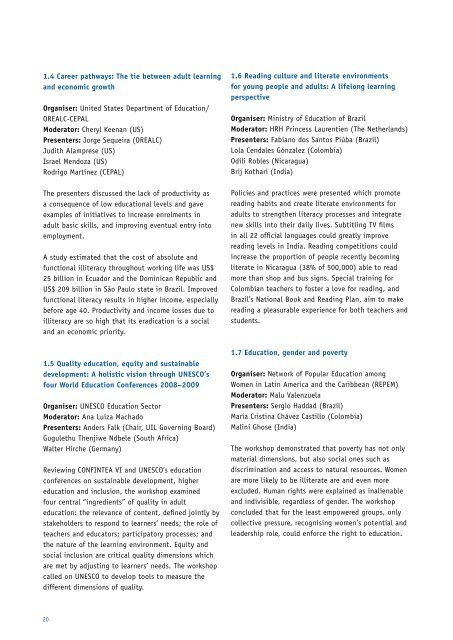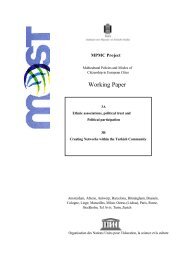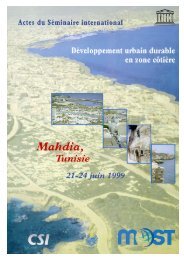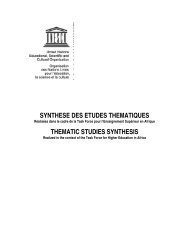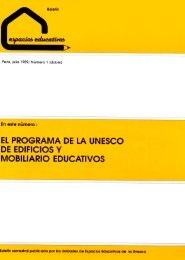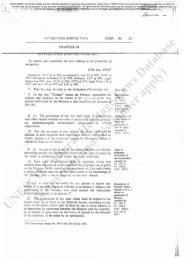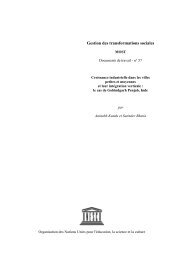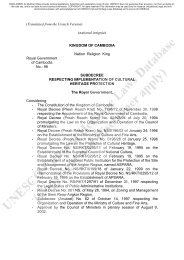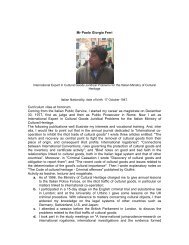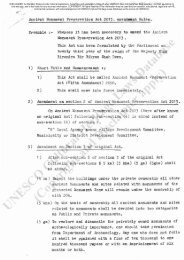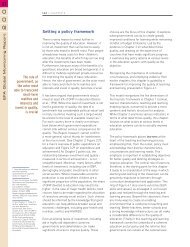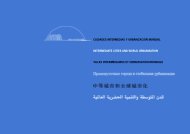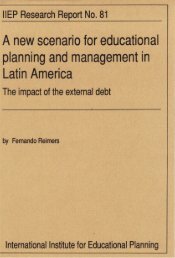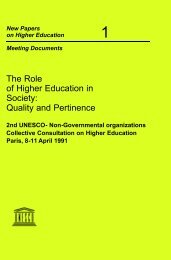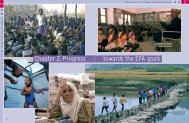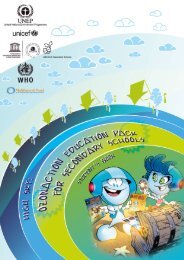CONFINTEA VI, final report - Unesco
CONFINTEA VI, final report - Unesco
CONFINTEA VI, final report - Unesco
Create successful ePaper yourself
Turn your PDF publications into a flip-book with our unique Google optimized e-Paper software.
1.4 Career pathways: The tie between adult learning<br />
and economic growth<br />
Organiser: United States Department of Education/<br />
OREALC-CEPAL<br />
Moderator: Cheryl Keenan (US)<br />
Presenters: Jorge Sequeira (OREALC)<br />
Judith Alamprese (US)<br />
Israel Mendoza (US)<br />
Rodrigo Martínez (CEPAL)<br />
The presenters discussed the lack of productivity as<br />
a consequence of low educational levels and gave<br />
examples of initiatives to increase enrolments in<br />
adult basic skills, and improving eventual entry into<br />
employment.<br />
A study estimated that the cost of absolute and<br />
functional illiteracy throughout working life was US$<br />
25 billion in Ecuador and the Dominican Republic and<br />
US$ 209 billion in São Paulo state in Brazil. Improved<br />
functional literacy results in higher income, especially<br />
before age 40. Productivity and income losses due to<br />
illiteracy are so high that its eradication is a social<br />
and an economic priority.<br />
1.5 Quality education, equity and sustainable<br />
development: A holistic vision through UNESCO’s<br />
four World Education Conferences 2008–2009<br />
Organiser: UNESCO Education Sector<br />
Moderator: Ana Luiza Machado<br />
Presenters: Anders Falk (Chair, UIL Governing Board)<br />
Gugulethu Thenjiwe Ndbele (South Africa)<br />
Walter Hirche (Germany)<br />
Reviewing <strong>CONFINTEA</strong> <strong>VI</strong> and UNESCO’s education<br />
conferences on sustainable development, higher<br />
education and inclusion, the workshop examined<br />
four central “ingredients” of quality in adult<br />
education: the relevance of content, defined jointly by<br />
stakeholders to respond to learners’ needs; the role of<br />
teachers and educators; participatory processes; and<br />
the nature of the learning environment. Equity and<br />
social inclusion are critical quality dimensions which<br />
are met by adjusting to learners’ needs. The workshop<br />
called on UNESCO to develop tools to measure the<br />
different dimensions of quality.<br />
20<br />
1.6 Reading culture and literate environments<br />
for young people and adults: A lifelong learning<br />
perspective<br />
Organiser: Ministry of Education of Brazil<br />
Moderator: HRH Princess Laurentien (The Netherlands)<br />
Presenters: Fabiano dos Santos Piúba (Brazil)<br />
Lola Cendales Gónzalez (Colombia)<br />
Odili Robles (Nicaragua)<br />
Brij Kothari (India)<br />
Policies and practices were presented which promote<br />
reading habits and create literate environments for<br />
adults to strengthen literacy processes and integrate<br />
new skills into their daily lives. Subtitling TV films<br />
in all 22 official languages could greatly improve<br />
reading levels in India. Reading competitions could<br />
increase the proportion of people recently becoming<br />
literate in Nicaragua (38% of 500,000) able to read<br />
more than shop and bus signs. Special training for<br />
Colombian teachers to foster a love for reading, and<br />
Brazil’s National Book and Reading Plan, aim to make<br />
reading a pleasurable experience for both teachers and<br />
students.<br />
1.7 Education, gender and poverty<br />
Organiser: Network of Popular Education among<br />
Women in Latin America and the Caribbean (REPEM)<br />
Moderator: Malu Valenzuela<br />
Presenters: Sergio Haddad (Brazil)<br />
María Cristina Chávez Castillo (Colombia)<br />
Malini Ghose (India)<br />
The workshop demonstrated that poverty has not only<br />
material dimensions, but also social ones such as<br />
discrimination and access to natural resources. Women<br />
are more likely to be illiterate are and even more<br />
excluded. Human rights were explained as inalienable<br />
and indivisible, regardless of gender. The workshop<br />
concluded that for the least empowered groups, only<br />
collective pressure, recognising women’s potential and<br />
leadership role, could enforce the right to education.


